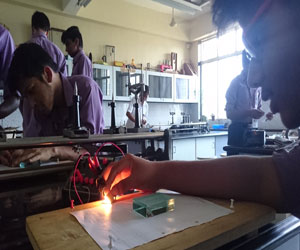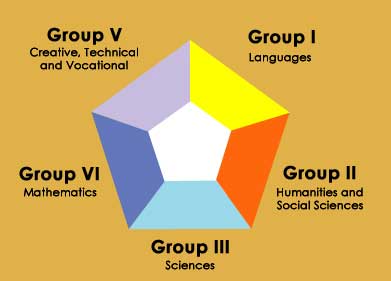- English (first language)
- English Literature
- Mathematics
- Science (Physics, Chemistry, Biology) & Environmental Studies
- Social Studies (History, Geography)
- II Language (Hindi & French)
- Art
- Physical Education
- Drama
- General Knowledge and Moral Science
The IGCSE curriculum is an option available to students in Std. VI in GEA. IGCSE Middle School are the years where the child transitions into young adulthood and it is important to focus on the needs of their particular age group. At the end of class 8, students will choose the subjects they wish to pursue for their Grade 10.
In the Middle School we aim to continue to challenge children, knowing they will rise to the occasion. We provide them as many opportunities as possible to explore, make choices and learn about themselves and each other. We want them to learn to inquire, reflect and discuss; to think critically, ask meaningful questions, listen with an open mind and to learn the skills needed to find solutions and solve problems for themselves.
Above all else, we want them to enjoy themselves and to be involved, responsible, respectful citizens of their class, school and society.
We aspire to nurture, enable and send into the world young men and women who believe in integrity, rationality, endeavour, tolerance, empathy, and above all, respect for themselves and others. We do this by providing a schooling that encourages intellectual curiosity, creativity, critical thinking, rigour, self-expression, individuality, independence and responsibility. In short, we seek to educate.
WHY SHOULD I TAKE THIS CURRICULUM FOR MY CHIID?
CIE curricula and qualifications are designed to support high-quality educational performance and to develop successful students.
A Cambridge international education is progressive and flexible.
CIE qualifications are recognized by universities and employers worldwide.
 Advantages of the Cambridge Program are that students will develop higher level skills like:
Advantages of the Cambridge Program are that students will develop higher level skills like:
- Acquisition of knowledge
- Writing
- Logic and thought process skills
- Emphasis on skills
- Application and use of creativity.
- Project based learning
- Creativity and analysis rather than rote memorization.
- Investigative learning approach
- Individual/group projects
- Internationally recognized
The Secondary Curriculum Framework identifies a set of learning objectives for English, Mathematics and Science for each year of lower secondary education. It forms the core of the Cambridge Secondary Programme and:
- provides natural progression from primary education through the three years of lower secondary education
- provides a structure that focuses on what students should be able to do at the end of each stage
- covers all learning objectives assessed in Cambridge Checkpoint - providing the option of using Cambridge Checkpoint tests, which are externally set and marked
- provides excellent preparation for candidates progressing to IGCSE or O Level courses.
IGCSE is a balanced curriculum and a flexible course of study.
- Most subjects offer a choice between core curriculum and extended curriculum.
- This gives students of all ability levels the freedom to choose subjects that are right for them and, thereby, the opportunity to score good grades.
- The core curriculum is an overview of the subject and is suitable for students who are expected to achieve grades C to G.
IGCSE subjects are grouped into five curriculum areas:
 Group I: Languages
Group I: Languages
Group II: Humanities and Social Sciences
Group III: Sciences
Group IV: Mathematics
Group V: Creative, Technical and Vocational
SUBJECTS AT GEA ARE A COMBINATION FROM EACH OF THE 5 GROUPS.
- English (first language)
- English Literature
- Mathematics
- Science (Physics, Chemistry, Biology) & Environmental Studies
- Social Studies (History, Geography) & Economics
- II Language (Hindi & French)
- Computer Studies
- Art
- Physical Education
- Drama
- General Knowledge and Moral Science
- English (first language)
- English Literature
- Mathematics
- Science (Physics, Chemistry, Biology) & Environmental Studies
- Social Studies (History, Geography) & Economics
- II Language (Hindi & French)
- Computer Studies
- Art
- Physical Education
- Drama
- Business Studies
- Basics of Accounting
- General Knowledge and Moral Science
- English (first language)
- English Literature
- Mathematics
- Science (Physics, Chemistry, Biology) & Environmental Studies
- Social Studies (History, Geography) & Economics
- II Language (Hindi & French)
- Business Studies
- Accounting
- Economics
- General Knowledge and Moral Science
Sciences:
Students are taught to observe record, analyze, hypothesize, research and apply knowledge.
Social Sciences:
Students are taught with emphasis on different perspectives and an understanding of cultural and geographical factors affecting events.
Languages:
English and Hindi are taught through activities and by encouraging reading and usage. French is an additional language being taught up to grade 8.
Mathematics:
The understanding of concepts and their application is emphasized and credit given for the method chosen as well as the skills involved. Students are gradually weaned from the concrete pictures, symbols leading to more abstract concepts. Experiential learning methods are applied to enhance understanding of concepts.
Computers:
Students learn to enjoy the use of computers with age-relevant programmes especially chosen to interest them and promote their understanding of computers at the same time reinforcing other subjects.
The academic year is divided into two term system. The first term is from April to September and the second term is from October to March.
ASSESSMENT STRATEGIES
All students are observed regularly with a focus on the individual, the group, and/or the whole class.
Students are presented with a task that represents the kind of challenges that adults face in the world beyond the classroom.
(research, thinking, communication, self management and social skills): The focus is on the process and skill application rather than on the product. These skills are regularly observed in real contexts using checklists, narrative notes, and inventories.
Students are presented with a challenge and asked to provide an original response.
These single-occasion assessments provide a snapshot of students’ specific knowledge.
An ongoing, purposeful collection is composed of selected student work and is designed to demonstrate growth, creativity, and reflection.
TYPES OF ASSESSMENTS
Pre-assessment occurs before embarking on new learning to uncover prior knowledge and experiences.
Formative assessment is woven into the daily learning process. It provides teachers and students with information about how the learning is developing. It helps the teacher to plan the next stage of learning.
Summative assessment occurs at the end of a teaching and learning cycle. Students are given the opportunity to demonstrate what they have learned by applying their knowledge in new and authentic contexts.
Students are graded through a series of on-going assessments of their course work, homework, class assignments and class participation. They also have term end assessments.
Assessment is not limited to conventional written papers and they consist of a variety of tests e.g. oral and listening tests.
- The assessment is aimed at a wide ability range of students, with an eight-point grading scale, from A* to G, with A* being the highest.
- Internal Assessment in the form of tests are conducted in each of the above subjects along with assignments and projects.
- During one academic year students will undertake two trials of examinations.
IMPORTANT ELEMENTS OF GRADING AT GEA:
- When calculating student grades, more weightage is given to summative assignments (assignments designed to evaluate student learning) than to formative assignments (assignments designed to provide practice and guide next-step instruction).
- Teachers are encouraged to provide second-chance learning opportunities for all students. Second-chance learning may include re teaching, extra practice, and the opportunity to demonstrate learning on another assessment.
- Teachers do not assign group grades. They assess the work and contributions of each individual student when grading collaborative assignments.
- Attendance, effort, volunteering in class, late coming to class, and other student compliance behaviours or disciplinary action may be considered when calculating student grades if they are a part of the essential outcome. Student behaviours are reflected in the comments that teachers make on the interim report or report card, communicated to parents via phone calls, conferences, or written communications.
Parents, students, and teachers are all valued partners in the reporting process and in sharing the responsibility both for learning and for accounting student progress. Pathways for communication need to be open and reciprocal.
GEA builds into the school calendar four formal parent-teacher conferences each year.
In addition, we provide many opportunities throughout the school year for conferencing. Parents, teachers, and/or students may participate, depending upon the purpose.
Written reports are completed at every year level.
Transdisciplinary Skills, Student Profile, and Attitudes are reflected in the comments that teachers write on every report card.
Apart from the school assessments and examinations, some external examinations have been identified as compulsory for the IGCSE students. These are reviewed annually.
The IGCSE at Gundecha Education Academy aims to provide a valuable educational experience for all students and to reward them for positive achievement: what they know, understand and can do - rather than penalize them for what they do not know or get wrong.
School Days and Timings
At GUNDECHA EDUCATION ACADEMY, the school days are Monday through Friday (five days per week) with occasional Saturdays, when required. The school time is as under and the time schedule has taken into account the schedule of co-curricular activities.
IGCSE School at GEA timings: 8:25a.m. to 3:00p.m.
Bus facility is available.
